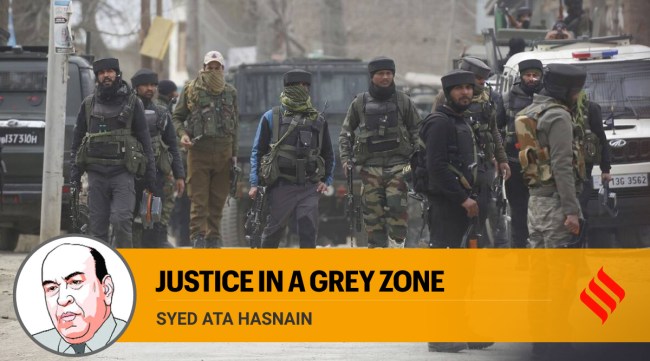Opinion Syed Ata Hasnain writes: With life sentence in Amshipora court-martial, Army’s commitment to rule of law stands reinforced
Indian Army’s record is guided by imperative of fairness to the people in the proxy conflict zone and also to its own soldiers. Respecting this fine balance requires leadership skills
 What the Army has repeatedly proved is that it does not fail to investigate genuine allegations but without adequate evidence, no such case goes to the prosecution stage. (Express Photo: Shuaib Masoodi/FIle)
What the Army has repeatedly proved is that it does not fail to investigate genuine allegations but without adequate evidence, no such case goes to the prosecution stage. (Express Photo: Shuaib Masoodi/FIle) In the many years that this writer dealt with terrorism in Kashmir, each command assignment began with a letter to my subordinate commanders. It stated that sustained deployment in operations and the dominant position occupied by the uniformed forces gave some soldiers (in rare cases) the temptation to go “beyond the brief”. If it was a risk taken for the sake of furthering the interests of the organisation, I would conditionally weigh my decision if I learnt of it. However, with any group of uniformed people that indulged in an indiscreet act that was for their personal gain (money or recognition), I would come down with a tonne of bricks – initiate disciplinary action.
While conducting counter-terrorist operations, soldiers do make genuine mistakes from time to time. These could be forgivable, but only after a thorough investigation. An example from field operations near Handwara explains this very well. On February 6, 2011, some soldiers in an orchard-based Army ambush challenged two young local boys moving in intense darkness. The latter were without lanterns or torches, which are mandatorily carried in these areas to prove you have no wrong intent. The boys ran in fear of being caught. The ambush opened fire and killed one while the other escaped. The officer truthfully reported the incident in which his men had followed the rules of engagement but fatally wounded a boy who was found without a weapon, proving almost certainly that he was innocent. Handling the case at night, my directions were clear. No effort to prove the youth as a terrorist was made by us. The family was given a job and monetary assistance. An inquiry was conducted jointly with the local police to confirm no mala fide intent was involved. Regret was expressed along with condolences through a personal visit to the family. The case never came up again.
A similar procedure was evident in the context of the recent media reports on the verdict of a General Court Martial (GCM), which was convened to try Captain Bhoopender Singh of 62 Rashtriya Rifles (RR). The officer was being tried for an alleged fake encounter at Amshipora, South Kashmir in July 2020. Three alleged terrorists who were killed were later identified as innocent labourers from Poonch. They had come to the general area of Shopian in search of work. The GCM has recommended life imprisonment for the officer, which will need to be confirmed by the Army Commander, Northern Command. The officer could have been given protection by the Army and central government but was rightly denied it. Under the Armed Forces Special Powers Act 1990 (AFSPA ‘90), soldiers acting in good faith are given protection from prosecution, suit or other legal proceedings but only with the sanction of the central government.
What needs to be understood by the public and civilian officials dealing with such cases is that in a counter-terrorism environment, the Army is called to conduct operations because these are outside the capability of all others. The separatists, terrorists and sponsors of proxy war will make every effort to discredit the Army in the eyes of the local public, national citizenry, political leadership and the international community in order to dent its effectiveness, tarnish its reputation and cause national embarrassment. It’s a “grey zone” out there as operations are mostly conducted on intelligence analyses, which may go wrong. Yet, the risk has to be taken.
If the army has to wait for information that is 100 per cent sure, it will hardly be able to conduct operations. It’s in this uncertainty that a heroic young officer may take a risk and succeed in a genuine operation, or a rogue officer may take advantage and attempt to execute a fake encounter for self-aggrandisement in the company of others from the police or some local people.
The best way to overcome this syndrome is to ensure that the system remains above board. All suspicious encounters must be investigated while being mindful of the fact that in the “grey zone,” there are manipulations of many kinds. In this respect, the Indian Army’s record is guided by imperative of fairness to the people in the proxy conflict zone and also to its own soldiers. Respecting this fine balance requires leadership skills.
In December 2004, I presided over the GCM of an officer accused of molesting a woman and her young daughter during the conduct of an operation. The officer could have been protected under AFSPA but the Army decided to prosecute him based on evidence. The GCM’s finding of attempted molestation and its sentence of dismissal was as per rules confirmed by the headquarters, but the same was set aside by a higher civil court. Sometimes, in its enthusiasm to be seen as above board, the Army may take decisions that appear to go against the interests of its rank and file. Yet, it is as per the rule of law.
In some cases, like the one involving the fake encounter at Machil in 2010, the opposite may happen. I inherited this case in 2010; we fought tooth and nail to take over the case as per law and convened a GCM and punished the alleged culprits. But when challenged in another higher court, it did not meet approval.
We do not know what the fate of the GCM verdict and sentence on the Amshipora encounter will be at the higher levels of approval. In all probability. it will receive confirmation. However, in subsequent revisions, no one can predict the outcome. What the Army has repeatedly proved is that it does not fail to investigate genuine allegations but without adequate evidence, no such case goes to the prosecution stage. The rule of law is equally applicable to soldiers and prosecution on flimsy evidence cannot be a norm for the sake of public appeasement.
The Army rightly stuck to its guns in two landmark cases. which are brought up each time a fake encounter is alleged. The Pathribal encounter and Kunan Poshpora mass rape case have been investigated and inadequate evidence found to initiate any prosecution.
The Indian Army stands firm on its principle of conducting “ethical operations” and has zero tolerance towards human rights violations and cases of misdemeanours.
The writer, a former corps commander of the Srinagar-based 15 Corps, is chancellor, Central University of Kashmir






